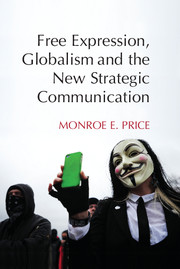Book contents
- Frontmatter
- Contents
- Acknowledgments
- 1 Moving the Needle, Filling the Streets
- 2 Strategic Communication and the Foundations of Free Expression
- 3 Narratives of Legitimacy
- 4 Strategies of the Diagnostic
- 5 Asymmetries and Strategic Communication
- 6 Strategies of System Architecture
- 7 Soft Power, Soft War
- 8 Religions and Strategic Communication
- 9 Regulating NGOs in the Market for Loyalties
- 10 Strategic Platforms
- 11 Strategic Communication and Satellite Channels
- 12 Strategies of Closure, Markers of Anxiety
- Bibliography
- Index
- References
9 - Regulating NGOs in the Market for Loyalties
Published online by Cambridge University Press: 18 December 2014
- Frontmatter
- Contents
- Acknowledgments
- 1 Moving the Needle, Filling the Streets
- 2 Strategic Communication and the Foundations of Free Expression
- 3 Narratives of Legitimacy
- 4 Strategies of the Diagnostic
- 5 Asymmetries and Strategic Communication
- 6 Strategies of System Architecture
- 7 Soft Power, Soft War
- 8 Religions and Strategic Communication
- 9 Regulating NGOs in the Market for Loyalties
- 10 Strategic Platforms
- 11 Strategic Communication and Satellite Channels
- 12 Strategies of Closure, Markers of Anxiety
- Bibliography
- Index
- References
Summary
I turn to non-governmental organizations (NGOs) as one of the most interesting and important categories of “sellers of allegiances” in a complex transnational market for loyalties. These groups, while functioning within a relatively opaque formula of international, political and civil rights, have become vital innovators in the process of reshaping attitudes and affecting behaviors around the world. They champion a wide range of issues, such as health, the environment and human rights. These issues have frequently been underrepresented in the public sphere, and their advocacy is often suppressed or muted. Many NGOs seek to gain traction for their causes by building support not only in the societies which gave birth to them, but in the external societies whose texture must also be affected if solutions are to be globally meaningful. Recent developments underscore how financing of such groups and other forms of government involvement affect the strategic response of target states to their effectiveness. Chapter 10, dealing largely with the Beijing Olympics of 2008, examines some techniques used by NGOs to advance their points of view.
NGOs have emerged as increasingly influential and visible entities in the public realm and as key actors in international debates, at times rivaling governments or acting as their proxies in terms of impact on certain issues. The category implies serving a particular significant social purpose, often humanitarian, that is altruistic and change-oriented. In fact, the category includes groups with very diverse objectives, varied along a political spectrum, varied by form of organization and by relationship to governments. Unlike businesses, NGOs are generally not profit-oriented, though they may be large and prosperous; unlike states, they ordinarily have no special status within the international system. As they push to become more successful players, these groups rely on the general adoption of a model of access, a model that implies the acceptance of certain international norms that give them greater opportunity to function in local and global markets. Many of these NGOs are engaged in strategic communication as I have defined it. They seek public support, often for positions deemed unorthodox by segments in the receiving society or by its government.
- Type
- Chapter
- Information
- Free Expression, Globalism, and the New Strategic Communication , pp. 176 - 192Publisher: Cambridge University PressPrint publication year: 2014



